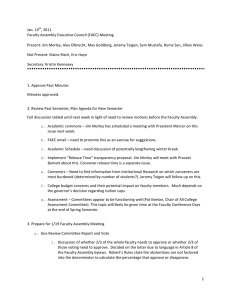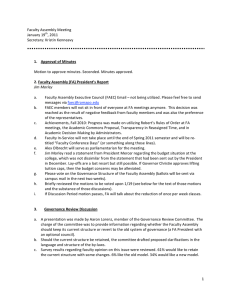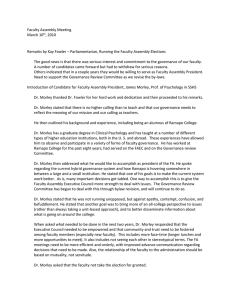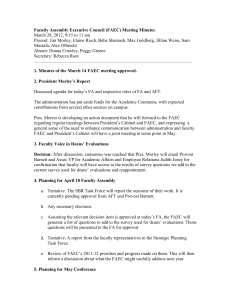Jan. 26 , 2011 Faculty Assembly Executive Council (FAEC) Meeting
advertisement
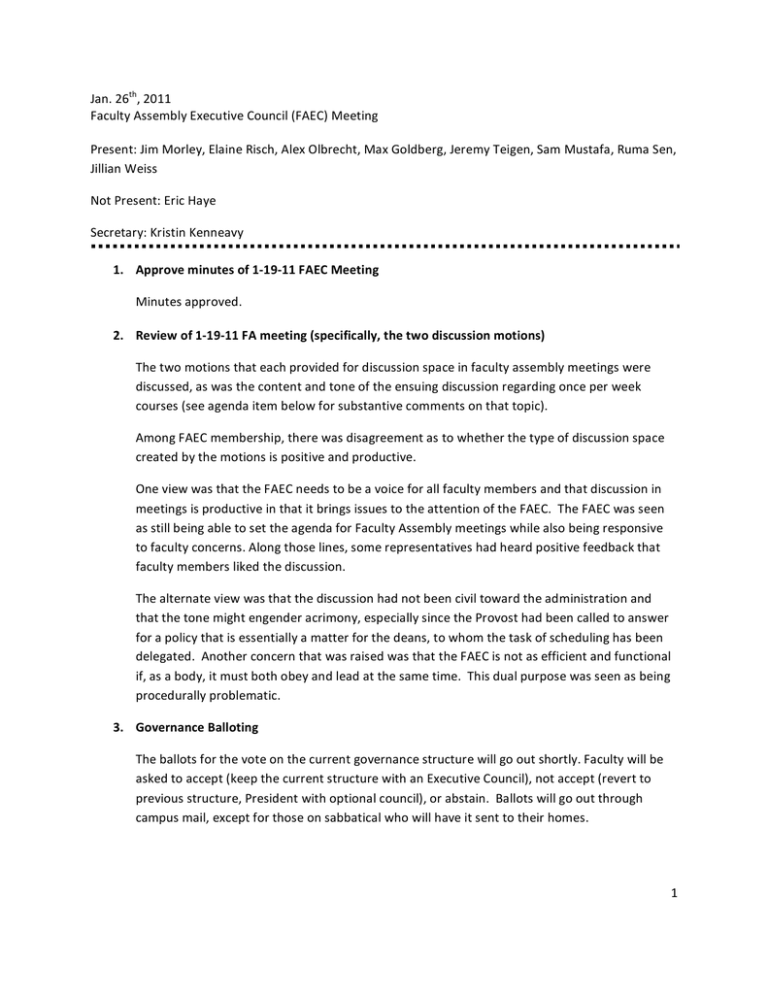
Jan. 26th, 2011 Faculty Assembly Executive Council (FAEC) Meeting Present: Jim Morley, Elaine Risch, Alex Olbrecht, Max Goldberg, Jeremy Teigen, Sam Mustafa, Ruma Sen, Jillian Weiss Not Present: Eric Haye Secretary: Kristin Kenneavy 1. Approve minutes of 1‐19‐11 FAEC Meeting Minutes approved. 2. Review of 1‐19‐11 FA meeting (specifically, the two discussion motions) The two motions that each provided for discussion space in faculty assembly meetings were discussed, as was the content and tone of the ensuing discussion regarding once per week courses (see agenda item below for substantive comments on that topic). Among FAEC membership, there was disagreement as to whether the type of discussion space created by the motions is positive and productive. One view was that the FAEC needs to be a voice for all faculty members and that discussion in meetings is productive in that it brings issues to the attention of the FAEC. The FAEC was seen as still being able to set the agenda for Faculty Assembly meetings while also being responsive to faculty concerns. Along those lines, some representatives had heard positive feedback that faculty members liked the discussion. The alternate view was that the discussion had not been civil toward the administration and that the tone might engender acrimony, especially since the Provost had been called to answer for a policy that is essentially a matter for the deans, to whom the task of scheduling has been delegated. Another concern that was raised was that the FAEC is not as efficient and functional if, as a body, it must both obey and lead at the same time. This dual purpose was seen as being procedurally problematic. 3. Governance Balloting The ballots for the vote on the current governance structure will go out shortly. Faculty will be asked to accept (keep the current structure with an Executive Council), not accept (revert to previous structure, President with optional council), or abstain. Ballots will go out through campus mail, except for those on sabbatical who will have it sent to their homes. 1 It was noted that the start date for the governance structure should be included (Sept. 1, 2011) and that the list of faculty and teaching staff be approved to make sure that everyone who is eligible to vote is, in fact, on the list. It was also resolved that the ballot should first include the recommendation set forth by the Governance Review Committee, followed by a statement of the motion, and then by the voting choices. 4. Discussion of Once per Week Courses The goal, as stated in the Strategic Plan, is to have only 25% of all courses be taught in a once per week format (keeping in mind that certain types of classes that require a once per week format are excluded from this figure, e.g. studio, labs, graduate courses, etc…). It appears that this is a matter that the deans are supposed to be implementing, as scheduling (while within the purview of the Provost’s office) has typically been a task delegated to the deans. Some units have already been working on this issue. For instance, Dean Steve Perry (CA) created a task force in fall 2010 to review courses for 1x/2x week schedule. The task force submitted its report in fall 2010, and changes are being implemented in the spring 2011 and fall 2011 schedules accordingly. A number of suggestions were made: (1) Determine whether this is actually a problem; it would appear that the pedagogical literature on this topic is mixed. (2) Need to find out more about how this will affect core requisites, such as Readings in the Humanities, history, etc… that are largely staffed by adjunct faculty members. (3) Won’t this change make scheduling within limited classroom space more difficult rather than less so? (4) Determine who, in fact, has authority over this issue. If this is a pedagogical decision, then faculty must have input. If it is scheduling, then the FAEC and FA need to work with the administration to come to a sensible target. After discussing a range of possible first steps, it was agreed that a motion should be crafted and brought before the Faculty Assembly for a vote and that the unit reps should bring this issue to unit councils to solicit feedback. The motion during new business asked for recommendations from both the FAEC and ARC on this matter. Discussion will continue at next week’s FAEC meeting. 5. Following Through on the Motions Passed Last November Webpage for Release Time Positions: Jim Morley and Max Goldberg will begin this process. Academic Commons: Jim Morley met with Peter Mercer, George Tabback, and Beth Barnett regarding this issue. The suggestion was that the area at the back of the cafeteria be walled off for faculty and staff use, with one entrance from the Atrium and one leading to the outside area. 2 A number of other possibilities were raised: a portion of the Birchtree dining room, one of the Student Center conference rooms, J. Lee’s, and the Pavilion. Jim Morley agreed to raise these possibilities with President Mercer. If multiple options are available, the matter will be put to a plurality vote of the Faculty Assembly. Student Life/Drinking: Jim Morley and Alex Olbrecht will be visiting Lehigh University to see how they approach student life. 6. Agenda for the Semester Limited discussion. Will likely revisit this at the next meeting. 7. Portfolios Limited discussion. This suggestion may not work well for the current governance model. 8. Planning for the May Faculty Conference The dates for this event need to be checked, but are likely May 17th and 18th. It was agreed that some time be devoted to assessment, but that two full days on that topic may be too much. Assessment committees would like to be able to report out, and possibly offer assessment workshops. Other possible topics: (1) The recent contention that students do not learn much during their first two years of college (according to a New York Times article). (2) Budget issues. (3) The results of the NSSE study. It was agreed that a list of topics be generated at the next FAEC meeting and that the Faculty Assembly be asked to vote for those topics that they found most interesting. 9. Next Meeting with Administrators It was determined that there was no pressing need for a meeting with administrators at this time, but that future topics of discussion would include (1) once per week courses and (2) efforts made by the President on behalf of the college in the New Jersey legislature in light of the current fiscal climate. 3
